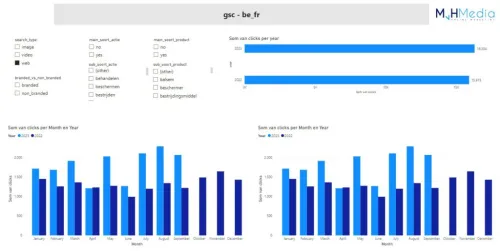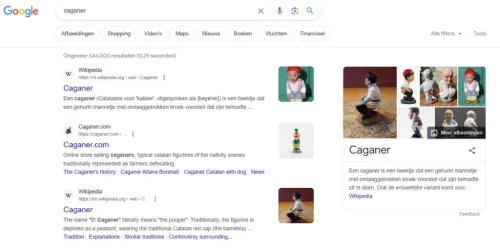The digital world knows no boundaries, and neither does SEO. For this reason, we also went international, and our specialists Linda and Antoine traveled to Barcelona to further expand our knowledge on this extensive topic during the International Search Summit 2023. These lectures, entirely dedicated to international SEO, provided various learnings to successfully put your brand, product, or service on the map in other countries or further increase the existing visibility. For anyone who couldn't attend but wants to be internationally present, we've listed the 10 most interesting learnings from this event for you.
1. Data is indispensable in international SEO
For the average website of a hundred pages, you can still manage reasonably without data. However, if you expand such a small website to, let's say, five languages, those hundred pages suddenly become five hundred pages, and with each new page, four language variants are added. What we're actually saying is: when you go international, you quickly lose track. Therefore, invest in tools like PowerBI or Looker Studio to keep your different pages easily accessible. Want to go Next Level? It's also possible to determine your content strategy entirely from data. When you use tools like ScreamingFrog to scrape your main on-page SEO elements and then combine this data with Google Search Console, you have a deep overview of your main SEO facets. Then let ChatGPT take a look, and you can get largely automated insights to guide you. This sounds a lot easier than it is, of course, but the main tip is that with a monolingual website, you can still manage SEO in a traditional way, but due to the complexity of international SEO, you almost can't avoid a strong data-driven strategy.

2. Quality over quantity, even in hreflang expansions
On-page SEO is becoming increasingly qualitative. The content must match the search intent (and we don't just mean text), the UX must be set up on both mobile and desktop so that the user can quickly find what they're looking for, and all those SEO texts can be much more human-focused. Think this way when you start expanding your languages. Is that Frenchman really waiting for your delicious Brabant sausage roll if the shipping costs exceed the purchase price five times, or do you want a Turkish language variant if the European delivery of your custom cabinets reaches up to the Eastern Bloc? Even if your website isn't large and crawl budget won't be an issue, you can be sure that Google won't let you rank. The tip is not to be led by countries with search volumes, but also ask yourself if people in these countries can and want to make a purchase with the shipping conditions you currently have. This way, you save yourself a lot of costs and effort in the long term.
3. Use an x-default hreflang
Most website builders have now realized that an international website needs hreflangs. Although things can still go wrong here, the point where we most often see it go wrong is the x-default annotation within these hreflangs. Does something go wrong when using it? No, but it is not used in 47.95% of cases. A shame if you ask Bill Hunt. He indicates that using the x-default is a great opportunity to prevent cross-market cannibalization. But what exactly is x-default? The x-default is the version that Google can show when it's not clear which location the user is in. You can use the English version for this, but a country selector is also a strong page to present to a user when the user's location is unknown.

4. Subfolders over ccTLD
Our specialist Kevin has already clearly discussed the differences between URL structures in the blog: International SEO Strategy – The Ultimate Guide, and during the ISS, there was no advocate for a ccTLD, other than the reason that it really can't be otherwise. Subfolders are the way to go, and the advice went so far that if you had a ccTLD structure, it is certainly worth converting this structure to a subfolder structure. Even if this means you are facing a migration process. The biggest mentioned advantages are a quick position rise that comes with a single strong domain and the fact that optimizations for different countries are much faster and at lower costs than when different websites are floating around the web.
5. Every country is custom
For everyone who is happy with AI making work easier, we have a bummer: every country remains custom. International SEO offers little chance of success when you open the floodgates to the different language versions and quietly wait. Each country is different, and so is Google in each country. The advice is therefore not only to localize your keyword research but also to make the SERP of each keyword insightful. With the Catalan Caganer, you are in Barcelona with a commercial page, in the Netherlands, you really have to be more on the informative side if you want to increase your visibility. The tip is not to look too quickly at keywords and volumes, but also dive into the SERP and analyze whether you have the right content to rank among these results. What also helps here is to keep an eye on the updates from Google per country. These changes have a lot of influence on who is at the top of the rankings, and not every update is implemented equally for all countries.

6. Even when it comes to E-E-A-T
The SERP certainly requires customization, but the E-E-A-T piece is also incredibly important to keep an eye on, but it requires a unique strategy per country. The quality of the content, reviews, localization of things like currency, delivery time, and shipping costs, available customer service, informative content, brand awareness, and local authority are all things you need to address per country and cannot be included in your global strategy. Even if you are a big brand in the Netherlands and go international via a subfolder to, for example, Germany, you will still have to come from afar to compete with the big boys and win over the target audience. The tip is therefore that if you really want to focus on a country, you have to keep in mind that you have to fully build up the E-E-A-T piece for that country to be able to compete.
7. Use AI content opportunities sustainably
AI is here to stay. Even for creating your international content, AI offers various opportunities to quickly get a lot of output, but do this thoughtfully. Whether you are an in-house marketer or work on the agency side: sit down together with the content specialists you work with and clearly indicate the benefits of AI. What you especially shouldn't do is create the illusion that AI will replace their jobs. With the possibility of AI, the task package only changes. Especially within international SEO, strong preparation is extra important. Besides the fact that your brand story must be overarching strong, it must also have the necessary localization. What tone of voice do we use per country? Which symbols or terms work, and especially which don't? This is where the focus of the content marketer should be to keep these things sharp. With AI, you get more time to pay attention to these kinds of things, so your final communication fits much better with the target audience per country. This helps you avoid mistakes and ensures a strong international online presence.
8. Look beyond your own website
You have determined your cluster of keywords, create the right pages, send local links to important keywords, do some E-E-A-T, manage to achieve top positions this way, but your revenue lags far behind your traffic. Besides the friendliness of your website playing a role here, there may be more going on. Where we in the Netherlands make a purchase with a low price and sufficient signals that a website is reliable, they can be very focused on big names abroad. The tip is therefore to closely monitor the visibility of Marketplaces in the SERP for your most important keywords, especially in markets that are very attached to big brands. When you are on an Etsy or Amazon, you can achieve your revenue goals more easily this way than with just the traffic you get on your own website.
9. Discover the power of emojis
Emojis in SEO? Yes, it may sound unusual, but we have found that it can work within your SEO strategy! Research shows that emojis do not harm your search engine rankings. In fact, they can give your CTR a significant boost, as long as you use them smartly and in the right context. What's even more interesting: Google is starting to understand emojis! ‘🍕near me ‘ as a search query can already be understood by Google.
We have seen that posts on Google Business Profile, jump links in recipes, or even adding them to your metadata can benefit from a touch of emoji magic 🌟. But be careful: it is important to choose emojis that fit your industry. And if you go international, make sure you know the meaning of the emojis well, as they can differ per culture.
A tip: avoid hand gestures or emojis with a skin tone, as they can be interpreted differently. And remember that Android and iOS display emojis differently. We will definitely experiment with this in the right industries to see what it does to our CTR. 🚀📈
10. Start with thorough research before going international
Perhaps the most important tip from the event is: ensure a strong analysis before making any changes to your website. We understand, you want to see results quickly, and SEO often takes longer than, for example, Ads. But SEO is also about sustainable growth for your business. Therefore, before you start with on-page optimization, technical aspects on the website, or link building, take the time to determine your objectives. Get to know the country or countries you want to focus on well, gather all the data you have about a country, analyze it, and only then consider whether your international SEO strategy really has a chance of success. Every culture and market is different, which means that the perfect strategy that works in the Netherlands will not necessarily work just as well with, for example, our southern neighbors. Even if this means that you don't change anything on your website for the first few months, this can ensure in the long term that you either save a lot of costs because you don't make wrong choices that have to be overturned over time, or grow much faster in the long term due to the thoughtful choices you made during this analysis phase.
Do you want to get started with international SEO and feel that even after reading this article, you could still use some help? Then our specialists are happy to assist you. Contact us or read more about how we set up our international SEO projects!




